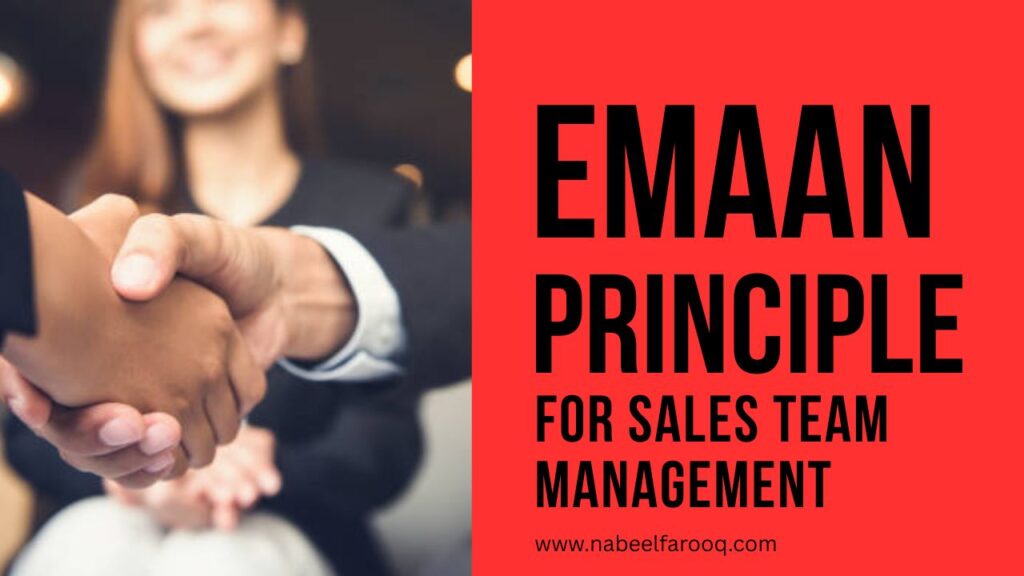
Sales teams are often treated like numbers—targets, charts, dashboards. But if you’ve ever built, led, or even survived a sales team, you know: managing people is way more emotional than analytical.
After spending 22 years in the field—ranging from startups to top multinational companies—I’ve learned one thing: Your sales team is your biggest asset.
They don’t just close deals—they carry your brand, fight in the trenches, and represent your company when no one else does.
And that’s where I introduce you to my proven formula:
The EMAAN Principle for Sales Team Management
This isn’t theory. It’s the distilled wisdom of my journey, and it’s worked every time. Let’s break it down.
🔑 E — Employment is Everyone’s Responsibility
A salesperson might be hired by HR, but in reality, they are employed by the entire company.
That means:
When a sales rep shares a lead with the technical team, they must respond quickly.
If there’s a customer question, everyone from ops to CEO must support them like they’re part of their own department.
Don’t make salespeople “follow up” internally. Make internal teams follow through.
This mindset changes the game. It creates a culture of accountability, not just pressure.
👀 M — Monitor, Don’t Micromanage
Yes, keep an eye. No, don’t hover.
Sales reps are creative beings. If you breathe down their neck:
You kill their confidence.
You kill the sale.
Instead:
Monitor silently and respectfully.
Track their activity without nagging.
Give them daily, weekly, monthly performance feedback—but don’t interrupt their flow over every small move.
When you review, ask:
“Did they fulfill their job description?”
“Are they hitting the outcomes we expected?”
That’s enough. Don’t become a control freak. Become a guide.
🙌 A — Appreciate. Always.
Every member of your sales team—junior or senior—craves appreciation.
It’s not just a “feel-good” factor. It’s fuel.
Celebrate daily wins.
Acknowledge the hustle.
Recognize extra efforts—even if they didn’t close the deal.
Appreciation builds trust, increases productivity, and reduces turnover. And the best part? It costs nothing.
❤️ A — Attach Yourself Emotionally
Let’s face it: Retaining good talent is the biggest struggle today.
So how do you keep great people from leaving?
Get emotionally invested in their lives. And I don’t just mean Friday pizza parties.
Here’s what I recommend:
If someone earns Rs. 100K, take ownership of part of their child’s school fees.
Offer to cover monthly groceries—send a package directly to their home.
Offer family-based incentives that say:
“We care about your home, not just your performance.”
What happens next? Their family becomes your retention partner.
When the employee thinks of leaving, it’s their family that tells them to stay. Powerful, right?
🚫 N — Never Take External Feedback About Your Team
Sales performance fluctuates. That’s normal.
Never let an outsider—even your close friend, cousin, or someone from another department—judge your team or suggest hiring/firing moves.
If you need advice:
Only take it from a business partner or someone involved in mutual decision-making.
Never let someone external to your sales process affect your internal culture.
Protect your team like family. Sales is a battlefield. Loyalty matters more than opinions.
🧠 Final Thoughts: Why EMAAN Works
EMAAN isn’t just an acronym.
It’s a principle of people-first leadership—especially in high-pressure environments like sales.
It helps you:
Build rock-solid loyalty
Reduce turnover
Increase morale and productivity
Create a family culture within your company
And trust me, this works in every environment—from startups to corporates.
I’ve applied this principle consistently across my career, and time after time, I’ve seen it help transform average sales teams into high-performing powerhouses.
🔁 Let’s Redefine Sales Management
In the end, managing a sales team isn’t about pushing for more deals.
It’s about understanding human behavior, nurturing it, and creating systems that honor their efforts.
EMAAN is my way of saying:
“Let’s lead with heart, not just strategy.”
Apply this principle, and watch your team turn into a tribe.